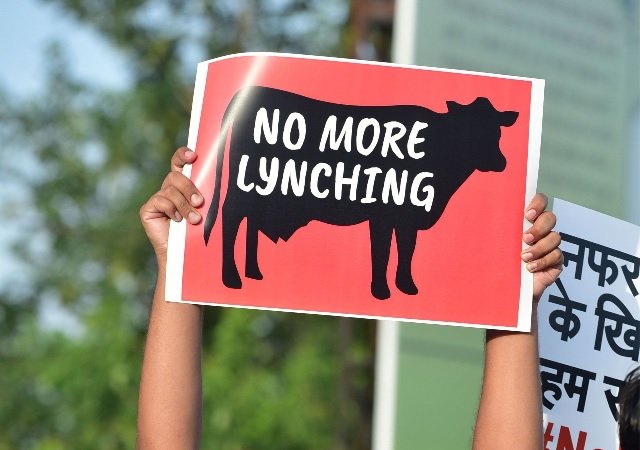Mohammed Ramees, TwoCircles.net
New Delhi: Around 10:30 PM on September 28, 2015, 50-year-old Akhlaq was brutally beaten and dragged by a frenzied mob fuelled by rumours of beef consumption. This horrifying incident received widespread coverage from both national and international media outlets, shocking the nation with its brutality.
Eight years later, in June alone, six people fell victim to mob lynchings, including an Imam lynched on July 2, yet these incidents barely made more than a passing mention in many newspapers. The protests and marches demanding justice for the arrested perpetrators often overshadowed the grief-stricken cries of the families left behind. Amidst a surge in such brutal acts, many of these tragic stories quickly faded into obscurity. Mohammed Shakir of Saharanpur was shocked to learn that three fellow townsmen had been lynched just last month.
In the most recent case, Shahabuddin, an Imam from Jharkhand, was killed on July 2. Following a scuffle with a woman over a bike-auto collision, he was fatally beaten by a mob. Despite her attempts to intervene, the mob remained relentless. The police, however, refuted allegations of a mob attack and maintained that Shahbudheen’s death resulted from the vehicle collision.
Another tragic incident involved Salman Vohra, a 23-year-old Muslim man from Gujarat’s Arang, who was killed by a mob after a cricket tournament. Salman, who had married just two months prior and whose wife was one month pregnant, worked in the fabric garment industry in Gujarat.
Tensions at the cricket tournament had already been inflamed due to discomfort with the stellar performance of Muslim players. During the quarterfinals and semifinals, some spectators began heckling the players with chants of ‘Jai Shree Ram’. The fatal attack on Salman ensued from a parking dispute, where his Muslim identity made him an easy target.
Salman’s uncle, Noman Nohra, recounted, “He suffered injuries to his right hand, a cut beneath his eyes and ear, and a fatal knife wound to the kidney.”
On June 7, Tahseen Khan (Guddu), aged 35, from Shamli district, along with his cousins Chand Miyan Khan (23) and Saddam Qureshi from Saharanpur, was brutally lynched by a mob while transporting buffalos. They were chased, beaten by cow vigilantes, and thrown off the bridge on Mahasamund-Arang Road.
On June 19, Mohammad Fareed alias Aurangzeb, aged 35, was lynched by a mob in Aligarh on suspicion of theft. According to a report by Quint, Fareed was mercilessly beaten with iron rods and dragged through the streets of Mamu Bhanja locality in Aligarh. A fact-finding report by the Communist Party of India (Marxist-Leninist) revealed that the mob targeted him because of his Muslim identity, with intent to kill. The Samajwadi Party and the Congress have demanded the DM to apply the NSA against the culprits, while BJP leaders defended the accused.
On June 24, Bindhu Sodhi, a woman from Toylanka village in Chhattisgarh, was allegedly murdered by a group of relatives due to her conversion to Christianity.
Numerous leaders and writers have voiced concerns over ‘election revenge’. RJD MP Manoj Kumar Jha stated, “Those who believed in Modi.3/NDA.3 bringing a new ‘Operating System’ should reconsider. The ‘Mob lynching’ of Muslims has intensified in several states, seemingly to punish them for voting in favor of a secular-democratic India. This trend must be challenged.”
In his debut address to Parliament, IUML MP and Supreme Court lawyer Haris Beeran condemned the attacks on Dalits and minorities following the election results, describing it as a regrettable state of affairs exacerbated by hate speech. He attributed the rise in attacks on minorities to offensive remarks made by the Prime Minister targeting a particular community.
Mohammed Twaha, president of the Student Federation of Jamia Millia Islamia, countered claims linking lynching to election results, stating, “Lynching has been normalized in India for years, serving as an ideological tool of RSS.”
The Congress party faced criticism for its initial silence on lynching and attacks against Muslims until Rahul Gandhi addressed the issue in Parliament on July 1. Activists questioned the opposition’s stance on lynching, with fact checker Mohammed Subair highlighting expectations from opposition supporters that their parties would speak out against Islamophobia.
Mohammed Rashiqe KV, an election analyst, pointed out, “Politically, the silence on lynching aids Congress in deflecting accusations of Muslim appeasement, despite being morally indefensible.”
In response to the Supreme Court’s directive, the Government of India has introduced stringent provisions against lynching in the Bharatiya Nyay Sanhita. The new law prescribes imprisonment ranging from seven years to life, and in some cases, the death penalty.


